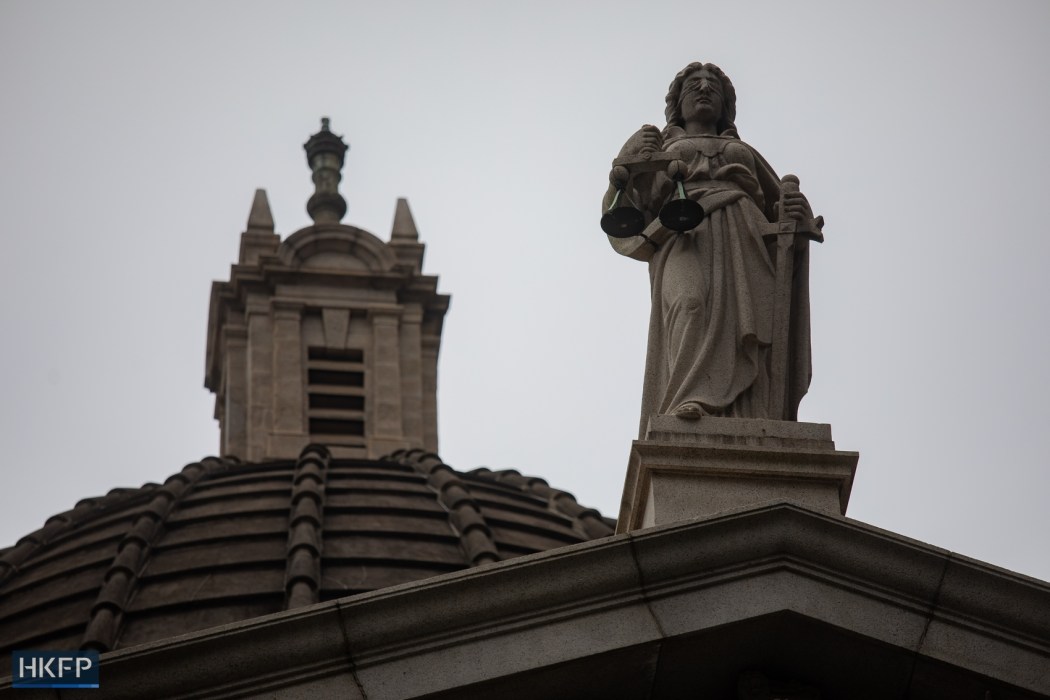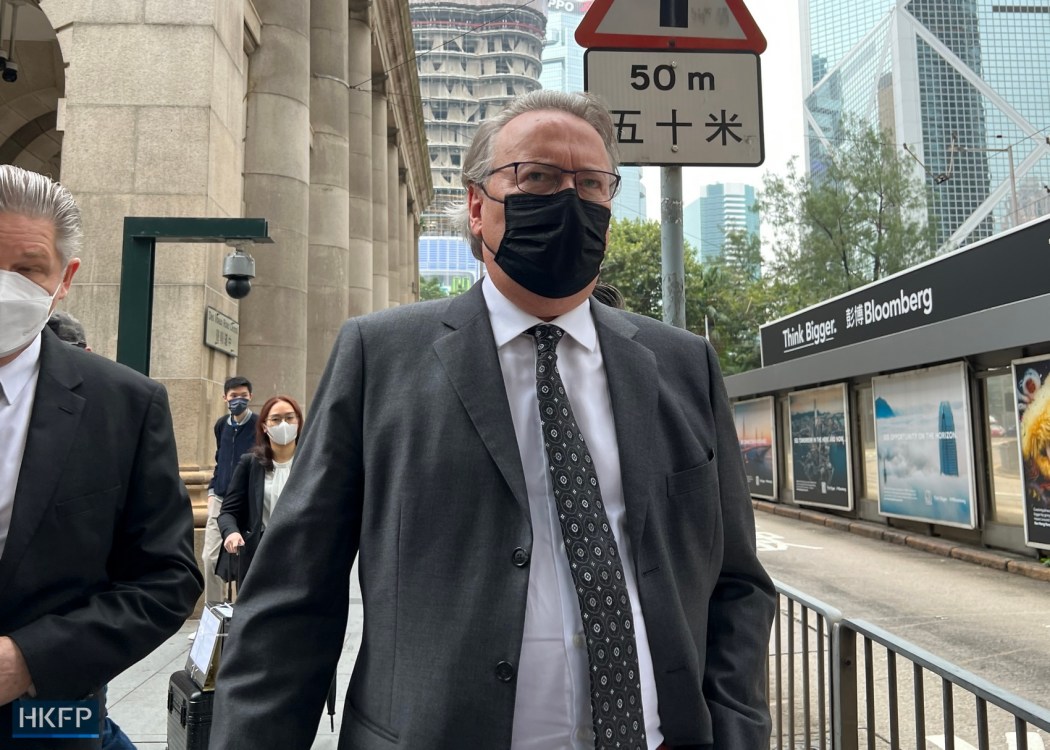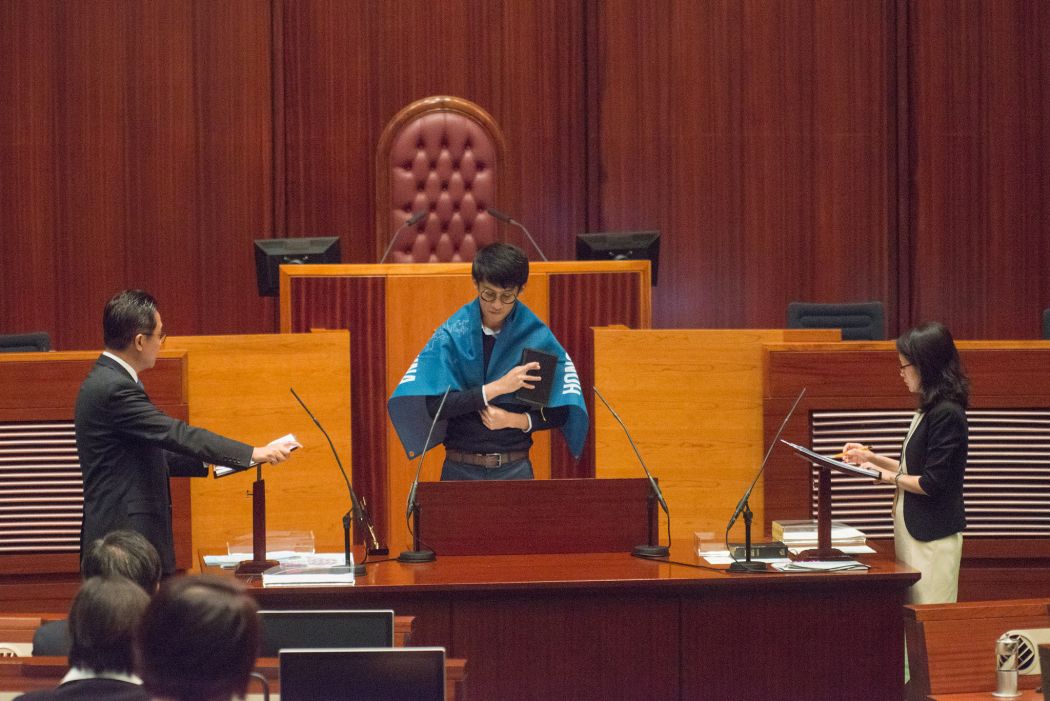China’s top law-making body issued its first interpretation of the national security law last month, after Hong Kong Chief Executive John Lee invited Beijing to intervene following a top court ruling.

The Standing Committee of the National People’s Congress (NPCSC) was asked to clarify whether foreign counsel who are not qualified to practise in Hong Kong are allowed to take part in national security cases in the city.
Ultimately, the NPCSC confirmed that the authority to make such decisions lay with the city’s leader and a national security committee.
Why was the interpretation made?
The debate on whether overseas counsel could participate in national security cases arose after media tycoon Jimmy Lai sought to hire King’s Counsel Timothy Owen to represent him in a national security trial, which has since been adjourned to September.
The Court of First Instance granted Owen’s admission in October last year, allowing Lai to hire the British barrister, less than two months before Lai’s trial was scheduled to start.
Following that, the secretary for justice made four attempts to block Owen’s admission, all of which were dismissed by the High Court or the Court of Final Appeal.
Timeline of debate over admission of Timothy Owen (Click to expand):
- September 30: Senior Counsel Robert Pang revealed in a case management hearing that the Department of Justice (DoJ) and Bar Council opposed Lai’s bid to hire Owen.
- October 19: High Court Judge Jeremy Poon granted an application to admit Owen as Lai’s counsel.
- October 27: Senior Counsel Benjamin Yu filed an appeal against the admission of Owen on behalf of the DoJ to the Court of Appeal.
- November 9: A panel of three judges in the Court of Appeal ruled against the DoJ’s appeal.
- November 15: The DoJ told HKFP that it had filed an application to the Court of Appeal for leave to appeal against Owen’s admission at the Court of Final Appeal.
- November 21: The Court of Appeal rejected the DoJ’s application for leave to appeal, filed by ex-justice secretary Rimsky Yuen.
- November 22: The DoJ files final appeal attempt to the top court.
- November 28, 4 p.m.: The Court of Final Appeal dismissed the DoJ’s application for leave to appeal.
- November 28, 6:45 p.m.: Chief Executive John Lee held a press conference announcing that he would invite Beijing to intervene.
- November 29: The DoJ applied to adjourn the trial.
- December 1: First day of trial against Lai, the Court of First Instance adjourned the case to December 13 as per prosecution’s request.
- December 13: Trial against Lai adjourned again to September 25, 2023.
- December 30: NPCSC passed legislative interpretation on the national security law.
Lai stands accused of four offences: two counts of conspiracy to collude with external forces and one count of collusion with external forces under the security law, and one count of conspiracy related to allegedly seditious materials under the colonial-era sedition law.
Article 65 of the security law stipulates that the NPCSC has the power to interpret the legislation, which was inserted into Hong Kong’s mini-constitution in June 2020.
The interpretation
The NPCSC interpreted two clauses of the Beijing-imposed national security law – Article 14 and Article 47.

Article 14 of the security legislation related to Hong Kong’s Committee for Safeguarding National Security, and stipulated that “no institution, organisation or individual” in Hong Kong could interfere with the committee’s work.
“Information relating to the work of the Committee shall not be subject to disclosure. Decisions made by the Committee shall not be amenable to judicial review,” the article stated.
The committee, chaired by the chief executive, consists of top officials including the chief secretary for administration, the financial secretary and the justice secretary, as well as the heads of the Security Bureau and the police force.
Article 47 stated that Hong Kong courts must obtain a certificate from the chief executive “to certify whether an act involves national security or whether the relevant evidence involves state secrets when such questions arise in the adjudication of a case.” That certificate is binding.
According to a national security report given by Lee to Beijing, which included the invitation to interpret the legislation, allowing overseas counsel not qualified to practise in Hong Kong to work on national security cases could threaten national security, the NPCSC said.
Whether these lawyers are allowed to take part in national security cases falls under the purview of Article 47, according to Beijing’s interpretation, meaning that Hong Kong’s courts should now obtain certification from the chief executive before ruling on whether to admit foreign counsel.

Should the courts fail to request certification from the chief executive, Article 14 determines that the Committee for Safeguarding National Security should step in and decide on the matter, the NPCSC said.
What does the interpretation mean for Lai’s trial?
In mid-December, Lai’s trial was adjourned to September as Beijing had yet to decide on whether to issue an interpretation.
While the interpretation did not decide directly whether overseas counsel were allowed to participate in national security cases, it confirmed that the chief executive and the Committee for Safeguarding National Security have the power to decide on the matter.
In a blog post published a day after the interpretation, Secretary for Justice Paul Lam said that as the court had not obtained certification from Lee, the committee would have to step in. The justice secretary cited suggestions that the Legal Practitioners Ordinance be amended to restrict foreign lawyers’ from participating in national security cases.

In an op-ed for HK01, Albert Chen, a legal scholar from the University of Hong Kong, wrote that even if the committee decided to amend the ordinance, it could only recommend to do so. The legislature would have to decide whether to pass the amendment.
Additionally, Chen said that the committee did not have the power to change existing court rulings related to Owen’s participation in Lai’s trial, but the government could still decide whether to grant Owen’s visa.
If the ordinance were amended and such restrictions were set, Owen would not be able to represent Lai regardless of previous court rulings, the HKU scholar wrote.
Simon Young, another HKU legal scholar, told HKFP on Friday that it seemed like the committee would advise the administration to table a bill to the legislature to amend the ordinance.
“The bill might provide that overseas counsel admitted already cannot appear in court in a [national security law] case unless he or she has obtained the [chief executive’s] approval,” Young said.

“The bill might also introduce a mechanism for the court to revisit a previous case of admission and require that court to obtain the [chief executive’s] certificate first otherwise the original admission decision is annulled.”
Previous legislative interpretations
Legislative interpretations from the NPCSC are not unique to the national security law.
Article 158 of the Basic Law states that the committee has the power to interpret the city’s mini-constitution. NPCSC decisions are binding to all future court decisions, but rulings made prior to the interpretations are not affected.
An NPCSC interpretation – which has happened on six occasions since the 1997 handover – is always controversial owing to the public perception that Beijing is undermining Hong Kong’s judicial independence.
The first interpretation took place in 1999, in the case of Ng Ka Ling v. Director of Immigration. The Hong Kong government asked Beijing to interpret Article 24 of the Basic Law after the Court of Final Appeal handed down a ruling entitling all Chinese citizens born in mainland China with Hong Kong parents to the right of abode.
The NPCSC later issued an interpretation saying that only children born in mainland China to Hong Kong parents who entered Hong Kong legally would be granted right of abode.
The government made the request for interpretation again in 2005, regarding the term of office of chief executives replacing predecessors who vacate their office prematurely.

The request was made after then-chief executive Tung Chee-hwa resigned citing health reasons, and debate arose over whether his successor should continue Tung’s remaining term or begin a new five-year tenure.
The standing committee later decided that Tung’s successor, Donald Tsang, should complete Tung’s remaining term.
Apart from occasions where the government invited the NPCSC to step in, interpretations were also issued on top decision-making body’s own accord, or by request from the courts.
In 2004, the NPCSC took the initiative to interpret the Basic Law concerning the chief executive election procedure, which added two more steps to the city’s path to universal suffrage. As a result, the NPCSC also decided that universal suffrage would not be implemented for the 2007 chief executive election.
In 2011, the Court of Final Appeal referred the case of Democratic Republic of the Congo v. FG Hemisphere to the NPCSC over the issue of state immunity. Beijing ruled that as the central government was responsible for Hong Kong’s foreign affairs, the city had to follow Beijing in allowing Congo absolute diplomatic immunity.
The NPCSC took the initiative to issue another interpretation in 2016 over the oath-taking requirement of lawmakers and officials as set out in Article 104. The interpretation resulted in the disqualification of six pro-democracy legislators-elect.

All of the interpretations sparked controversy in Hong Kong, with the members of the city’s legal profession holding silent marches to protest some of the interpretations. Major legal groups, the Hong Kong Bar Association and the Law Society, also voiced concerns.
However, those legal groups did not oppose Beijing’s interpretation of the national security law last week.
“We expect the [chief executive] and the committee will exercise their power in a way that fosters the public’s trust in upholding the rule of law, judicial independence and protecting the human rights as enshrined in the Basic Law as the [national security law] continues to operate in our unique legal system under the principle of One Country, Two Systems,” the Bar Association’s statement published last Saturday read.
President of the Law Society Chan Chak-ming said that the group would study the details of the interpretation, and that it “will work closely with the government when considering amendments to the Legal Practitioners Ordinance.”
Support HKFP | Policies & Ethics | Error/typo? | Contact Us | Newsletter | Transparency & Annual Report | Apps
Help safeguard press freedom & keep HKFP free for all readers by supporting our team
























